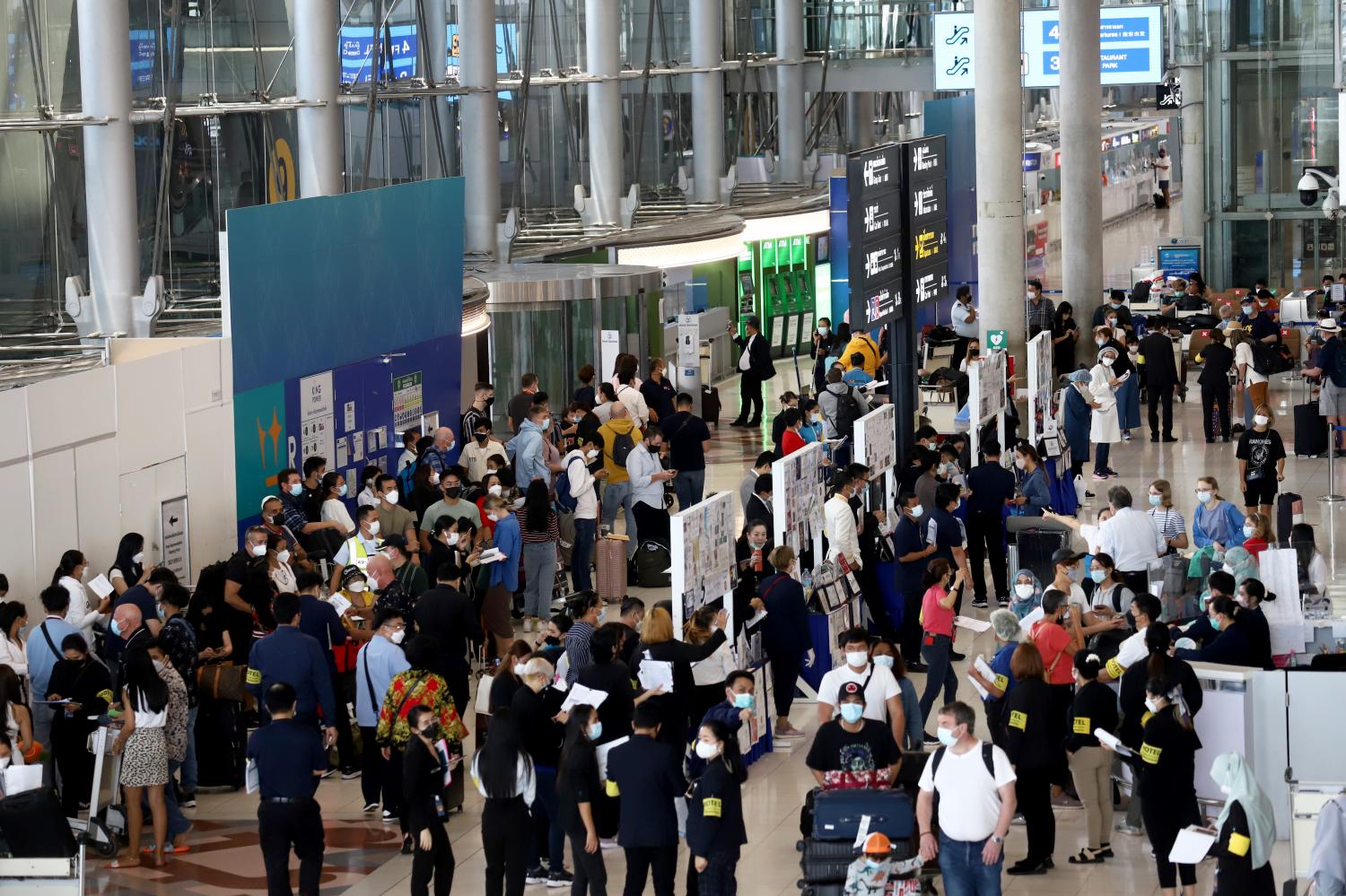
Starting from April 1, visitors entering Thailand enjoy more relaxed conditions after authorities dropped a negative pre-arrival RT-PCR Covid-19 test requirement. Yet the hotel sector remains adamant that a recovery is impossible until all the rules are removed.
What are the new Test & Go rules?
Travellers no longer have to present a negative pre-arrival RT-PCR test, while the minimum health insurance coverage was lowered to US$20,000 for visitors arriving under the Test & Go, Sandbox and quarantine programmes from April 1.
The new rules, meant to resuscitate the battered tourism sector, still require travellers to undergo an RT-PCR Covid-19 test upon arrival, and then an antigen self-test on Day 5.
Prime Minister Prayut Chan-o-cha said he instructed all related agencies to prepare for an influx of foreign tourists under the revised system, but cautioned that both the public and private sectors had a collective responsibility to ensure there were no hiccups.
What has been the response from the hotel sector?
Marisa Sukosol Nunbhakdi, president of the Thai Hotels Association, said there had been an increase in the number of overseas arrivals following the removal of the pre-arrival RT-PCR test.
"After the lifting of the pre-arrival test, we are seeing a climb in international arrivals, but it is a very slow climb," she said. "The numbers are still very small and not nearly enough for a full recovery. To get a larger flow of incoming visitors, the government must do away with all restrictions: the RT-PCR test on arrival, Covid insurance requirements, and also the Thailand Pass."
From last November, when the reopening started, to the end of February 2022, roughly 555,000 travellers entered Thailand through the Test & Go programme, while the Sandbox programme welcomed about 200,000 visitors.
But in March alone, there were 229,000 Test & Go travellers, with the top five source countries being Singapore, Germany, the Philippines, the UK and the US. Prior to March, Russia was the largest source of international tourists for Thailand, before its invasion of Ukraine.
"You can see numbers picking up in March, and they will most likely grow further in April because of a very low base to start with and key source markets starting to travel again, such as India, Malaysia, South Korea, Singapore, and hopefully soon Japan," Mrs Marisa said.
Who can visit Thailand now?
As for eligibility, fully vaccinated travellers from all countries and territories can participate in Test & Go. The entry points now cover air, land and sea.
Air -- Travellers from anywhere taking direct international flights can enter Thailand from eight airports: Don Mueang, Suvarnabhumi, Phuket, Krabi, Koh Samui, Chiang Mai, U-tapao and Hat Yai.
Land -- Three designated checkpoints are set up in Nong Khai, Songkhla and Satun. However, this option is only available to Thai citizens and foreign travellers from neighbouring countries.
Water -- Travellers from anywhere onboard private yachts or cruise ships can enter Thailand.
What are the new requirements and documents needed to enter Thailand?
• Thailand Pass registration
• Insurance with minimum coverage of $20,000. Expats living and working in Thailand under a valid visa or a residential permit are required to provide proof of insurance coverage in Thailand with minimum coverage of $20,000 or a valid social security card or certified letter from their employer.
• Proof of payment for one night of accommodation at an SHA Extra Plus hotel
• A Covid-19 vaccination or recovery certificate
• Thai visa (if required)
Whom can you contact if you need help with Thailand Pass?
Thailand Pass is a free online system designed to make documentation checks more efficient. It is required for travellers intending to enter by air and land. Applicants must submit all required documents for Thailand Pass at least seven days before their intended departure date.
The Thai government has reported that some applications using Yahoo or Hotmail email accounts have experienced significant delays. It is recommended visitors register with a Gmail account instead.
However, the process of obtaining Thailand Pass verification can be complicated for some travellers. You may reach out for help or questions via the following channels.
Travellers to Phuket, Krabi, Trat and Phangnga can contact thailandpass.hkt@gmail.com. For other destinations, visitors can call +66 (2)-572-8442, +66 065-205-4247, +66 065-205-4248, +66 065-205-4249, or testgo@consular.go.th.
The Bangkok Post attempted to call the above numbers. The average wait time to speak to an agent was roughly 7-10 minutes.
For questions related to vaccinations, travellers can call the Department of Disease Control at +66 (2)-134-0139 during business hours or +66 (2)-134-0140 at any time of the day.
What happens to a traveller who tests positive for Covid-19 in Thailand?
Depending on the condition of the traveller, he or she may be medically advised to receive treatment in either a hospital, hotel isolation or community isolation. After recovering from Covid-19, the traveller will receive a medical certificate of recovery.
According to Thailand's Communicable Diseases Act of 2015, the medical expenses must be covered by the required insurance or at the foreign traveller's own expense, along with national healthcare coverage for Thais and eligible foreign expatriates. The government recommends travellers read the fine print of any Covid-19 insurance policy before purchase. The policy should cover the cost of treatment and other medical expenses associated with being infected with Covid-19, including in-patient hospitalisation, hospital isolation, hotel isolation or related quarantine.
